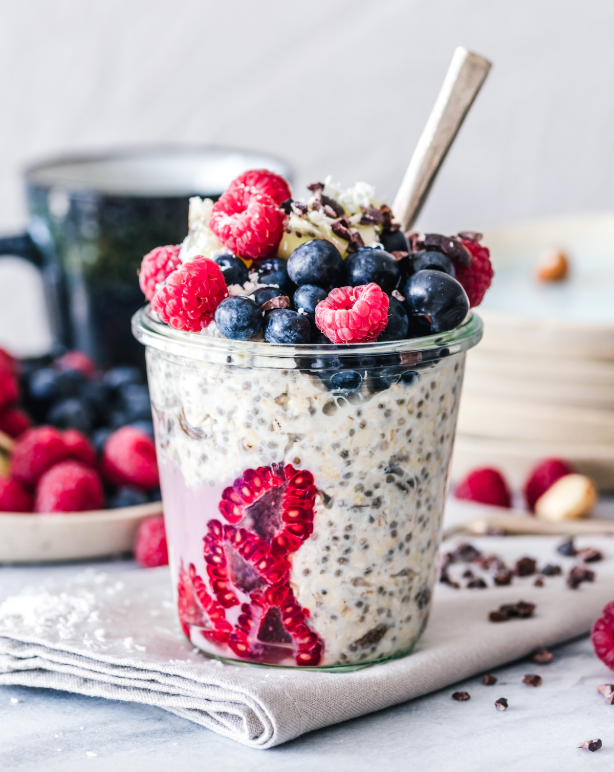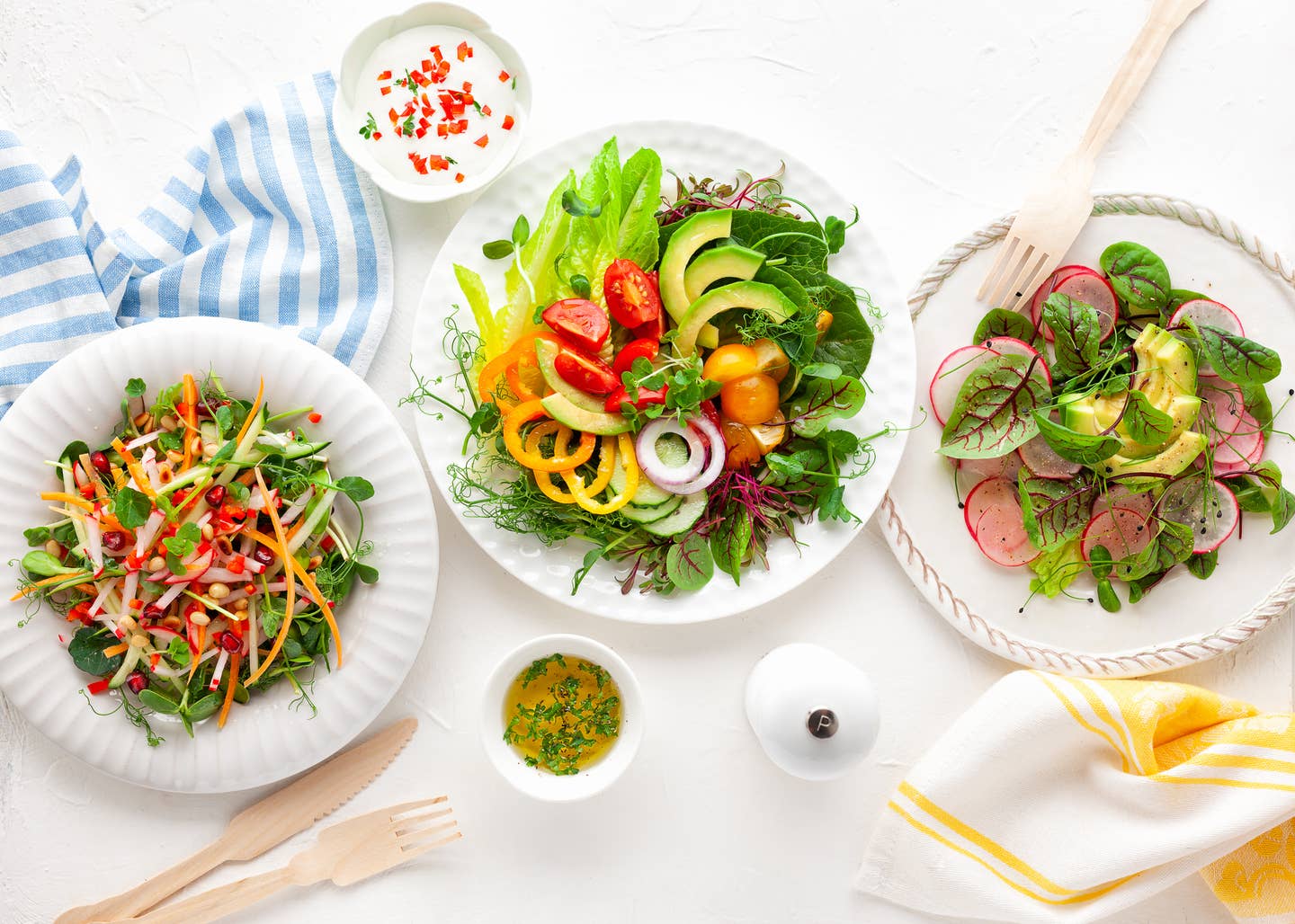
The 6 Seeds with the Most Protein
This is the season when we actually get excited about seeds. Pumpkin seeds are one of the most fun parts of carving that pumpkin since you can roast them with a touch of salt and they come out as a tasty treat for the rest of the ghoulish season and pack a protein punch that makes them healthy and delicious. So get carving, snacking and check out the other seeds to add to your rotation -- whether you sprinkle them on your cereal, salad, acai bowl or in your smoothie.
Fast facts about seeds
By weight, hemp seeds provide similar amounts of protein as beef and lamb, so 2–3 tablespoons of hemp seeds, provide about 11 grams of protein. They are considered a complete protein source, which means that they provide all the essential amino
We found six seeds that deserve recognition for being protein heroes, and they also contain other nutrients that give you energy and provide health benefits when following a plant-based diet. The best part about seeds is that you can buy them virtually anywhere already roasted, salted, or unsalted; however, you choose!
1. Pumpkin Seeds
The nutrients in a pumpkin seed are actually in the white shell. Bake them in a 300 degree oven with light seasoning or just salt for a minimum of 45 minutes and snack as you carve away. 1 ounce equal Protein - 9.2g Calories - 146 Carbs - 3.8g Calcium - 12mg
2. Hemp Seeds
Hemp seeds and marijuana come from the same plant, Cannabis sativa. The difference is that they are extracted from different parts of the plant (pot is the leaves, hemp is the seed). Hemp seeds also have .3% traces of THC, the euphoria-producing ingredient in pot, whereas marijuana contains anywhere from .4% and up depending on the strain. 1 ounce equals Protein - 6.3 g Calories - 110.7 Carbs - 1.7 g Calcium - 1.1%
3. Sunflower
Sunflower seeds come from the middle of the flower head. The type of sunflower seed is based on what sunflower hybrid it comes from. The two types fall under the category oilseed or non-oilseed type. 2 tablespoons equal Protein - 5.4g Calories - 163 Carbs - 6.7g Calcium - 19.6mg
4. Flax Seeds
Flax seeds are better digested if they are ground up. Whole seeds are harder to digest because of their shells. Quick tip: If you buy whole seeds, use a coffee grinder to make your own ground flax seeds and store in an airtight container for freshness. 1 ounce equals Protein - 5.1g Calories - 150 Carbs - 8.1 g Calcium - 71.4mg
5. Sesame Seeds
Sesame seeds can be used as a garnish or in the base of a smooth tahini sauce. Combine 2 cups of sesame seeds with a couple of tablespoons of avocado in a food processor and the product is a tahini to use on a salad or veggies. 1 ounce equals Protein - 4.7g Calories - 158 Carbs - 7.2g Calcium - 277mg
6. Chia Seeds
Because they can be used as an egg replacement, chia seeds make vegan baking easy. Combine one tablespoon of chia seeds with two to three tablespoons of water to make a single egg replacement for your next cake or brownies. 1 ounce equals Protein - 4.4g Calories - 137 Carbs - 12.3g Calcium - 177mg
The 11 Nuts That Pack the Protein
1. Peanuts
Peanuts are actually not nuts—they're legumes which grow underground, so they are in the same family as chickpeas, soybeans and lentils. Crazy stunt: Scientists have made diamonds out of peanuts by putting them under enormous pressure. 1 ounce equals Protein - 7.31 g Calories - 161 Carbs - 4.57 g Fiber - 2.41 g Calcium - 26.1 mg
2. Almonds
Almonds are part of the cherry, peach, and mango family, since they are a drupe (a fleshy fruit with skin thin and central seed). When you eat a peach or mango, notice how the pit looks similar to an almond. There are over 30 different varieties and eight out of 10 almonds are grown in California. It takes over 1 gallon of water to produce a single almond, or 1900 gallons to grow 1 pound. 1 ounce equals Protein - 6g Calories - 164 Carbs - 6.11g Fiber - 3.5 g Calcium - 76.3mg
3. Pistachios
Pistachios are one of the oldest nut trees in the world. Humans ate pistachios as early as 7,000 B.C. They spread across the Middle East to the Mediterranean and were viewed as a royal delicacy. 1 ounce equals Protein - 5.72 g Calories - 159 Carbs - 7.7 g Fiber - 3 g Calcium - 29.8 mg
4. Cashews
Get ready, because November 23rd is National Cashew Day! The U.S eats over 90% of the world’s cashews. These tree nuts start out as apples. Harvesters then take the seed from the bottom of the apple and before the seed is roasted, it is usually green. Roasting or steaming the cashew neutralizes the oils and makes them safe to eat—meaning raw cashews aren't *truly* raw. 1 ounce equals Protein - 5.16 g Calories - 157 Carbs - 8.56 g Fiber - 0.936 g Calcium - 10.5 mg
5. Walnuts
Walnuts contain more Omega-3 fatty acids than any other nut, so they are an excellent brain food to boost memory (they even look like little brains!). To keep them fresher longer, store walnuts in the fridge or freezer, since they have a tendency to go rancid quickly. 1 ounce equals Protein - 4.32g Calories - 185 Carbs - 3.89g Fiber - 1.9g Calcium - 27.8mg
6. Hazelnuts
Hazelnuts contain healthy doses of fiber, folate and vitamin E. Hazelnut oil is so rich it's used in combination with palm oil for cleaning and polishing wood. We love them with dark chocolate. 1 ounce equals Protein - 4.24 g Calories - 178 Carbs - 4.73 g Fiber - 2.75 g Calcium - 32.3 mg
7. Brazil Nuts
It is illegal to cut down a Brazil nut tree, which live for up to 500 years. These are like the candy of the nut family since a cup has 876 calories, and each nut is 85% fat and 14% protein. They're rich in selenium, a mineral prized for thyroid support. 1 ounce equals Protein - 4.06 g Calories - 187 Carbs - 3.33 g Fiber - 2.13 g Calcium - 45.4 mg
8. Pine Nuts
Pine nut is another type of seed that is clumped in with the nuts. They are so expensive because they are tedious to gather. They grow in the pine cone, but you generally can't consume pine nuts from a pine cone you'd find in your park or backyard as not all pine nuts are edible. Most of the pine nuts you eat come from the stone pine tree in Asia, Europe and North America. 1 ounce equals Protein - 3.88 g Calories - 191 Carbs - 3.71 g Fiber - 1.05 g Calcium - 4.54 mg
9. Pecans
French people who settled in New Orleans created the first pecan pie, since pecans are native to the southern US. On average, 78 pecans are used in one pie. There are over 1,000 varieties of pecans, and many are named after Native American tribes. 1 ounce equals Protein - 2.6g Calories - 196 Carbs - 3.93 g Fiber - 2.72 g Calcium - 19.8 mg
10. Macadamia Nuts
Macadamia nuts are actually seeds. It takes 12-15 years for a macadamia tree to grow to its full size. Most of the world’s macadamia nuts come from Hawaii. They are high in carbs and protein, but keep these nuts away from dogs since they make them sick. 1 ounce equals Protein - 2.24 g Calories - 204 Carbs - 3.92 g Fiber - 2.44 g Calcium - 24.1 mg
11. Chestnuts
Chestnuts are the only nut that contains vitamin C. The trees were hit by blight in the nineties and 3 billion trees were eventually wiped out. Chestnuts are used in beer and cake and eaten creamed around the holidays. Chestnut flour is gluten-free, making it a great alternative for cookies, pies and stuffing. 1 ounce equals Protein - 1.19g Calories - 63.5 Carbs - 13.9g Calcium - 5.1mg
More From The Beet






